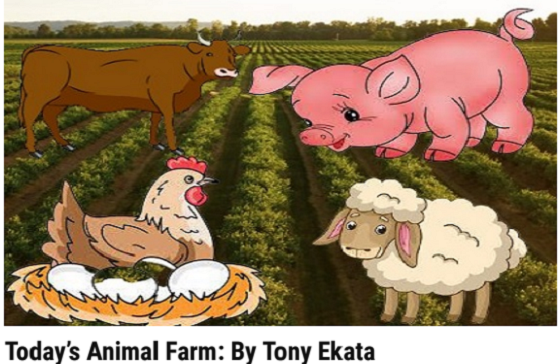Post Published on October 1, 2024 by Anthony Ekata
My son has just put Matric behind him, and I am very happy – perhaps happier than him. For one, the haunting spectre of having to cough up some seven thousand rands (about 500 US dollars) to re-enrol the National Senior Certificate examination, if he had failed, has been put to rest. In addition to that, my phone can now breathe again.
Let me explain.
When he was preparing for the final exams, he downloaded a lot of Online study material into my phone with the excuse that the space in his own phone had been taken up by similar material. I conceded without argument, as I had no intention of providing an alibi for woeful performance, should that come to be. The price I had to pay for that concession was that during the exams, my phone had to be rotated between us to enable him to use it to ‘study’ although, a few times, I caught him using it for other purposes.
I could easily have bought a bigger-size data card for his phone, but I didn’t because I knew that would give him space to store more video games than study material. Then the exams ended about a month ago. I wanted to delete his stuff from my phone but decided to hold on until the results of the exams were released – for obvious reasons. Not that I doubted his ability to pass, but you never know, you know.
Then, a couple of days ago, after he got his result, I glanced through the folders with a view to determining which ones should be deleted and found, to my fascination, some interesting perspectives on Animal Farm; that evergreen fable written by George Orwell between 1943 and 1944; some 74 years ago!
We first read Animal Farm in junior secondary school in the seventies. Then, it was more of entertainment value to us than anything else. In my son’s case, over four decades later, it was one of the Literature texts they had to read for the final high school English Language paper, which, in South Africa, incorporates Literature in English.
For the sake of those who have not read the novella, let’s begin from the beginning. Animal Farm is about a rebellion by animals against their owner, Mr Jones, based on a dream by Old Major, a prize-winning boar. In the dream, according to Old Major, all animals live together with no humans to oppress or control them. Old Major comes up with a song, Beasts of England, which serves as the rallying cry and manifesto to convince the animals to support the revolution:
Beasts of England, beasts of Ireland,
Beasts of every land and clime,
Hearken to my joyful tiding
Of the golden future time.
‘Beasts of England’ stirs the emotions of the animals and fires their revolutionary idealism. The song gives the beasts both courage and solace. The lofty optimism of the words “golden future time,” which appear in the last verse, serves to keep the animals focused on the Rebellion’s goals so that they ignore the suffering along the way. They succeed in expelling Mr Jones from the farm and form a government of the animals, by the animals and for the animals. They enact the Seven Commandments (their Constitution), otherwise known as the Seven Principles of Animalism viz:
Whatever goes upon two legs is an enemy
Whatever goes upon four legs, or has wings, is a friend
No animal shall wear clothes
No animal shall sleep in a bed
No animal shall drink alcohol
No animal shall kill any other animal
All animals are equal
It was not long before the elite class (the pigs) turned these principles upside down. At first, Animal Farm prospers. Then power struggle ensues between the two leading pigs; Napoleon and Snowball. Using his secretly raised attack dogs, Napoleon chases Snowball out of the farm, assumes total leadership and bans all meetings. He continues to use his attack dogs to eliminate every opposition.
Napoleon begins expanding his powers, rewriting history to make Snowball a villain. Napoleon also begins to act more and more like a human being—sleeping in a bed, drinking whisky, and engaging in trade with neighbouring farmers. The original Animalist principles strictly forbade such activities, but Squealer, Napoleon’s propagandist, justifies every action to the other animals, convincing them that Napoleon is a great leader and is making things better for everyone— despite the fact that the common animals are cold, hungry, and overworked. All the Principles of Animalism are breached by Napoleon and his ruling elite (cabinet) and eventually reduced to “All animals are equal but some are more equal than the others”.
The amazing thing about Orwell’s Animal Farm is the universality and timelessness of the overarching theme. Today, globally, equality before the law is touted along with several freedoms as constitutional entitlements of all citizens. The reality, though, is that members of the ruling class, represented by the pigs in Animal Farm, see themselves as the privileged “some” while the other animals (masses) exist to serve only their larger glory.
Also, the characters in the novella have parallels in every society and every generation. Orwell wrote Animal Farm as an allegory; a symbolic representation of real events. Many characters and events in the book symbolise people in the Russian Revolution and the Soviet Union: Mr. Jones (represents the Russian Tsar and the aristocratic order), Old Major (Karl Marx and Vladimir Lenin; the fathers of communism), Napoleon (Stalin), Snowball (Trotsky), Squealer (the press; and in modern society, press secretaries/information ministers, etc.) the pigs (ruling bureaucrats), and Moses the Raven (organised religion). Nearly all the other animals represent the working class and Soviet peasants.
The traits of these various characters can easily be identified in many contemporary government cabinets across the world. For instance, Napoleon is a corrupt opportunist. Napoleon never made a single contribution to the revolution—not to the formulation of its ideology and not to the new society’s initial attempts to establish itself. He never shows interest in the strength of Animal Farm itself, only in the strength of his power over it. Thus, the only project he undertakes with enthusiasm is the training of a litter of puppies. He doesn’t educate them for their own good or the good of all, but rather for his own good: they become his own private army or secret police, a violent means by which he imposes his will on others.
Snowball, a parallel to Leon Trotsky, emerges as a fervent ideologue who throws himself, heart and soul, into the attempt to spread Animalism. His idealism, however, leads to his downfall. Relying only on the force of his own logic and rhetorical skill to gain his influence, he proves no match for Napoleon’s show of brute force. Orwell suggests, through Snowball, that we cannot eliminate government corruption by electing principled individuals to roles of power; he reminds us throughout the novella that it is power itself that corrupts.
Boxer epitomises all of the best qualities of the exploited working class: dedication, loyalty, and a huge capacity for labour. He also, however, suffers from what Orwell saw as the working class’s major weaknesses: a naïve trust in the good intentions of the intelligentsia and an inability to recognise even the most blatant forms of political corruption – and deception.
In Animal Farm, the glib pig Squealer abuses language to justify Napoleon’s actions and policies to the proletariat. By radically simplifying language—as when he teaches the sheep to bleat “Four legs good, two legs better!”— he limits the terms of debate. Those seeking power or seeking to consolidate power often resort to the same tactic – sloganeering. Consider: Power to the People, For the Many Not the Few, Make America Great Again! Real Change Now, A Real Alternative, Next Level, Let’s Get Nigeria Working Again, No to Poverty, Transformation Time, etc.
On the other hand, by complicating language unnecessarily, Squealer confuses and intimidates the uneducated, as when he explains that pigs, who are the “brain workers” of the farm, consume milk and apples not for pleasure but for the good of their comrades. Squealer’s lack of conscience and unwavering loyalty to his leader, alongside his rhetorical skills, make him the perfect propagandist for any tyranny.
All over the world, the template is the same. Those who seek power demonise the incumbent and portray themselves as messiahs. That was the narrative that propelled the revolution in Animal Farm. Old Major said:
“Man is the only real enemy we have. Remove Man from the scene, and the root cause of hunger and overwork is abolished forever. Man is the only creature that consumes without producing. He does not give milk, he does not lay eggs, he is too weak to pull the plough, he cannot run fast enough to catch rabbits. Yet, he is lord of all the animals. He sets them to work, he gives back to them the bare minimum that will prevent them from starving, and the rest he keeps for himself.”
A similar thread runs through the electioneering rhetoric of those seeking power; from the Warrego to Limpopo, from the Tigris to the Thames, and from Mississippi to River Niger. Until the masses wake up from their slumber and smell the coffee, they will continue to remain pawns in the hands of self-serving, power-drunk, and thick-skinned pseudo-messiahs whose overriding motivation is power for the sake of power.
(From ‘Random Thoughts: A Collection of Essays & Poems’ by Tony Ekata
First published on January 10, 2017
@ http://www.newsplus.com.ng/todays-animal-farm/ (defunct)







